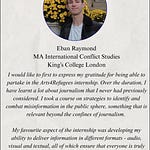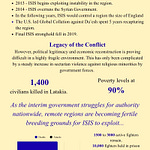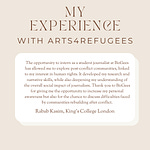Can Mosul Rise Again? A Look at Its Post-ISIS Recovery🌱
Deep Dive with Zakaria 💬
Nov 05, 2024
∙ Paid
What happens when the war ends? Exclusive Insights from GenZ Citizen Journalists
Communities are re-building themselves after the conflict is over. How well are they coping with this experience. Listen for more.
Communities are re-building themselves after the conflict is over. How well are they coping with this experience. Listen for more. Listen on
Substack App
Spotify
YouTube Music
YouTube
Pocket Casts
RSS Feed
Appears in episode
Recent Episodes












